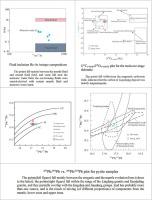Ore Geology Reviews ( IF 3.2 ) Pub Date : 2023-02-02 , DOI: 10.1016/j.oregeorev.2023.105330 Yiwen Xu , Guangzhou Mao , Hongyan Geng , Tieliang He , Qinglin Xu , Yuanku Meng , Mingping Cao , Fengjie Yang , Pengrui An , Liguo Song , Yixin Dou , Yu Wang , Xiaowei Yu , Ying Shen

|
The Jiaodong Peninsula is the most important gold province in China, and the Liaoshang gold deposit represents a major recent prospecting breakthrough in Jiaodong. Based on detailed metallographic and microstructural observations, and He-Ar-Pb isotope compositions of fluid inclusions from main-ore-stage pyrite were presented, as well as the C O isotope compositions of main-ore-stage dolomite. Fluid inclusions from the pyrite have 3He = 1.18 – 8.69 × 10-14 cm3STP/g, 4He = 1.21 – 3.24 × 10-7 cm3STP/g, and 3He/4He = 0.12 – 0.81 Ra, and the ore-forming fluid was mainly crustal-sourced with mantle fluid input. The fluid inclusions have 40Ar = 5.42 – 1.87 × 10-7 cm3STP/g, 40Ar/36Ar = 328.5 – 511.3, close to saturated meteoric water 40Ar/36Ar value. It is speculated that the crustal-sourced ore fluid may have had meteoric water input in the mineralization. The main-ore-stage dolomite contains δ13C = -2.9 to −4.4 ‰ and δ18OV-SMOW = 10.5 to 11.3 ‰. It is speculated that the carbon was mainly deep magmatic fluid- or magma-sourced. The pyrite has 206Pb/204Pb = 17.244 – 17.416, 207Pb/204Pb = 15.448 – 15.462, 208Pb/204Pb = 37.824 – 37.950, and 206Pb/207Pb = 1.116 – 1.125, indicating that the ore-forming materials were derived from a crust-mantle-mixed source, which we considered to be the Linglong granite and the Jiaodong (or Jingshan) Group wallrocks. We conclude that the ore-forming fluids and materials at Liaoshang have multiple and complex sources, and that the Mesozoic tectono-magmatic activities have a clear control on the formation and distribution of the Liaoshang gold orebodies..
O isotope compositions of main-ore-stage dolomite. Fluid inclusions from the pyrite have 3He = 1.18 – 8.69 × 10-14 cm3STP/g, 4He = 1.21 – 3.24 × 10-7 cm3STP/g, and 3He/4He = 0.12 – 0.81 Ra, and the ore-forming fluid was mainly crustal-sourced with mantle fluid input. The fluid inclusions have 40Ar = 5.42 – 1.87 × 10-7 cm3STP/g, 40Ar/36Ar = 328.5 – 511.3, close to saturated meteoric water 40Ar/36Ar value. It is speculated that the crustal-sourced ore fluid may have had meteoric water input in the mineralization. The main-ore-stage dolomite contains δ13C = -2.9 to −4.4 ‰ and δ18OV-SMOW = 10.5 to 11.3 ‰. It is speculated that the carbon was mainly deep magmatic fluid- or magma-sourced. The pyrite has 206Pb/204Pb = 17.244 – 17.416, 207Pb/204Pb = 15.448 – 15.462, 208Pb/204Pb = 37.824 – 37.950, and 206Pb/207Pb = 1.116 – 1.125, indicating that the ore-forming materials were derived from a crust-mantle-mixed source, which we considered to be the Linglong granite and the Jiaodong (or Jingshan) Group wallrocks. We conclude that the ore-forming fluids and materials at Liaoshang have multiple and complex sources, and that the Mesozoic tectono-magmatic activities have a clear control on the formation and distribution of the Liaoshang gold orebodies..































 京公网安备 11010802027423号
京公网安备 11010802027423号